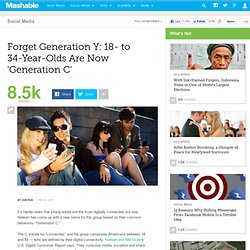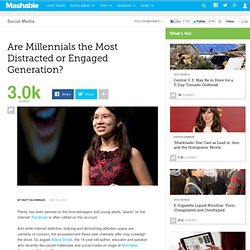

Is Too Much Tech Bad for the Modern Teenager? [INFOGRAPHIC] Is tech saturation good or bad for the modern teenager?
![Is Too Much Tech Bad for the Modern Teenager? [INFOGRAPHIC]](http://cdn.pearltrees.com/s/pic/th/modern-teenager-infographic-28685009)
Arguments can be made either way, but there's no debating that today's teens are more wired than ever. And digital permeates the lives of young people in general, too. People aged 18-34 have an average of 319 online connections, according to a recent Pew Research Center study. That's compared to an average of 198 connections for the 35-46 group, and the numbers continue to decrease from there. Pew also recently reported that 63% of teenagers text message with friends on a daily basis, compared to 39% who speak on the phone daily and just 35% who interact face-to-face outside of school.
But the digital revolution comes with drawbacks. The Internet education portal OnlineSchools.com combined the Kaiser and Pew findings with research from Common Sense Media and other organizations to put together an infographic showing how technology is affecting young people. Do you think total tech immersion does more to help or hurt teenagers? Forget Generation Y: 18- to 34-Year-Olds Are Now 'Generation C' It's hardly news that young adults are the most digitally connected, but now Nielsen has come up with a new name for this group based on their common behaviors: "Generation C.

" The C stands for "connected," and the group comprises Americans between 18 and 34 — who are defined by their digital connectivity, Nielsen and NM Incite’s U.S. Digital Consumer Report says. They consume media, socialize and share experiences through devices more than other age groups. The most recent U.S. Census finds 18- to 24-year-olds make up 23% of the population.
"Their ownership and use of connected devices makes them incredibly unique consumers, representing both a challenge and opportunity for marketers and content providers alike," Nielsen writes. The below graphic visualizes different Nielsen numbers on American media consumption. Are you a part of "Generation C? " Click the image to enlarge.
Image courtesy of iStockphoto, izusek. Technology Creating a Generation of Distracted Students [STUDY] A new study by the Pew Research Center has found that though digital technology has reshaped the way students conduct research, it has been harmful in the way students process material and their overall ability to distinguish quality content from unreliable sources. 87% of teachers in the study — performed in conjunction with the College Board and the National Writing Project — said technology is creating an “easily distracted generation with short attention spans.”
![Technology Creating a Generation of Distracted Students [STUDY]](http://cdn.pearltrees.com/s/pic/th/technology-generation-43472830)
And 64% of teachers (from middle and high schools) say today’s digital technologies “do more to distract students than to help them academically.” Teachers, though, remained somewhat optimistic about digital impact, with 77% saying Internet search tools have had a “mostly positive” impact on their students’ work. Lee Rainie, director of the Pew Internet Project, tells Mashable that the problem could be the lack of digital literacy training students receive, not the technology itself.
Image courtesy of iStockphoto, 3bugsmom. Are Millennials the Most Distracted or Engaged Generation? Plenty has been penned on the time teenagers and young adults "waste" on the Internet.

Facebook is often vilified on this account. And while Internet addiction, bullying and diminishing attention spans are certainly of concern, the empowerment these new channels offer may outweigh the drivel. So argues Adora Svitak, the 14-year-old author, educator and speaker who recently discussed millennials and social media on stage at Mashable Connect in Orlando, Fla. Svitak made a compelling case for social empowerment among "the generation of eye-rollers," drawing from recent trends, studies and anecdotes from her own life growing up in the thick of a changing social landscape. Only problem is, adults can have a hard time understanding just how beneficial that engagement can be.
Facebook Is the New Study Hall It's a challenge for kids to live in a world of constant communication (as we all do), and suddenly turn it off in a classroom of textbooks and blackboards.